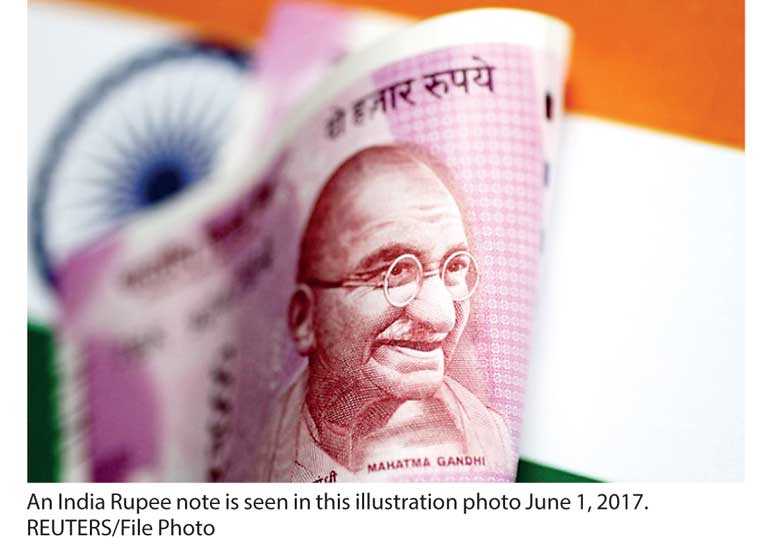Thursday Feb 26, 2026
Thursday Feb 26, 2026
Friday, 5 October 2018 00:00 - - {{hitsCtrl.values.hits}}
 MUMBAI (Reuters): The rupee plumbed record lows as global oil prices rose and stocks and bonds weakened on Thursday, heightening speculation that the Reserve Bank of India (RBI) may hike interest rates on Friday more aggressively than earlier expected.
MUMBAI (Reuters): The rupee plumbed record lows as global oil prices rose and stocks and bonds weakened on Thursday, heightening speculation that the Reserve Bank of India (RBI) may hike interest rates on Friday more aggressively than earlier expected.
A majority of analysts polled by Reuters last week expected a third consecutive 25 basis point increase in the key repo rate, currently set at 6.50%, though speculation has mounted in recent days that the RBI could opt for a 50 bps hike.
“Expectations are building for an aggressive rate response, but the policy committee’s inflation mandate and the current benign trend, backs the case for a measured 25 bps rate hike,” Radhika Rao, an economist at DBS wrote in a note on Thursday.
The partially convertible rupee hit a life low of 73.82 per dollar before recovering to 73.62/63 by 0710 GMT. It had closed at 73.3350 on Wednesday.
One forex dealer at a foreign bank, who asked not to be named, said early intervention by the central bank stopped the rupee from hitting 74 per dollar, but it is still down 13.3% since the start of the year, making it the worst performer among Asia’s emerging market currencies.
The fall in the rupee also led to a sharp rise in government bond yields, due to increasing expectations that the RBI’s monetary policy committee (MPC) could go for a bigger rate increase than expected on Friday.
“Markets are in a panic right now, they are probably pricing in more rate hikes than what the MPC can deliver,” a senior debt trader at a private bank said.
Confidence has ebbed in India’s markets in recent weeks. The rupee has set all-time lows, bonds are at their weakest since November 2014, and share markets have suffered a sharp correction after hitting record highs in August.
A liquidity scare erupted last month after a series of debt defaults by Infrastructure Leasing & Financial Services (IL&FS) sparked redemption pressure at other shadow banking companies.
And dollar selling by the RBI to support the rupee has put a further squeeze on rupee liquidity. Rising global oil prices, they climbed 2% on Wednesday to hit a four year-high, are bad news for importing nations like India.
The current account has faced additional pressure as India, like many emerging market economies, has also suffered due to rising US interest rates drawing investors away.
In the latest of a series of attempts to calm markets, the government late on Wednesday said it would allow state oil marketing companies (OMCs) to raise $10 billion in overseas loans to help them cover the sharp rise in price for imported oil.
Last week, the RBI’s eased banks’ liquidity coverage ratio norms last week, and announced it would be buying 360 billion rupees of government bonds through open market bond purchases to soothe the liquidity worries haunting markets.
With speculation growing for steeper interest rate rises, the benchmark 10-year bond yield rose as much as 10 basis points to 8.21%, not far from 8.23% hit in late September which was the highest since November 2014.
In the share markets, the Nifty was down 1.95% at 10,647 as of 0713 GMT, hitting its lowest level since 3 July. The Sensex was 1.88% lower, its lowest level in three months. Both the indexes are on track for a 10th fall in 12 sessions.
Financials and energy stocks led the falls, while Reliance Industries dropped 5.7%, contributing to over a third of the NSE index’s losses. Housing Development Finance Corp Ltd was down 1.8%.
India’s gold imports are expected to rise further in the fourth quarter, putting the trade balance under more pressure, as investors seek hedges against faltering equities and the weak rupee.
NEW DELHI (Reuters): India is facing an “economic crisis” due to its huge oil imports, two local TV channels cited Transport Minister Nitin Gadkari as saying on Thursday, ahead of a meeting of key ministers to discuss the falling rupee and the nation’s widening trade deficit.
India, the world’s third biggest oil importer, depends on overseas markets to meet 80% of its oil needs.
The partially convertible rupee has lost about 13% against the dollar since the beginning of the year, adding to the nation’s oil import bill at a time when crude is hovering at around $85 a barrel.